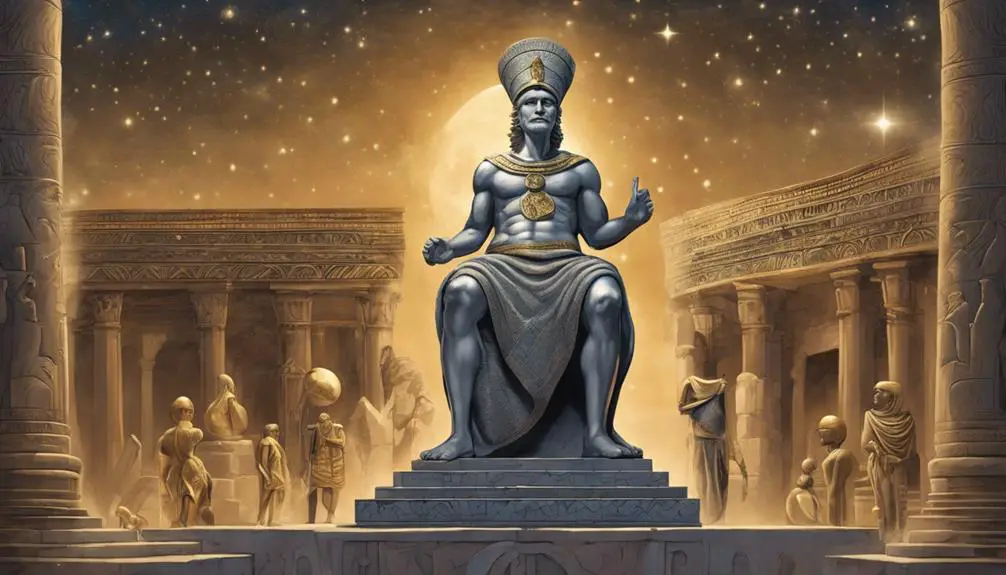Unravel the mystery of the Bible's New World Order prophecy and its implications for today's world in this thought-provoking exploration.

New World Order in the Bible
You've stumbled upon the most mysterious and debated puzzle pieces in the entire Bible: the concept of a New World Order. Biblical prophecies, from Daniel's vision of successive kingdoms to Revelation's apocalyptic forecasts, have sparked endless discussions on what a divinely governed world might look like.
As you navigate through ancient texts, you'll find yourself questioning how these age-old predictions align with our modern world. Are we inching closer to unity and divine governance, or are these prophecies merely symbolic?
Join this exploration to uncover the truth behind these ancient prophecies and their relevance today.
Key Takeaways
- The concept of a New World Order is deeply rooted in biblical prophecies, symbolizing a divine governance and global unity.
- Daniel's vision and Revelation's apocalyptic predictions provide insights into the succession of empires and the ultimate establishment of divine authority.
- Interpretations of these prophecies vary, requiring a deep understanding of historical context, language, and symbolism.
- Biblical narratives advocate for a future of peace, justice, and love under a unified heavenly kingdom, aligning with the ideals of a New World Order.
Biblical Prophecies Unveiled

The concept of a New World Order has its roots in various biblical prophecies, revealing a complex tapestry of divine intentions and human destinies. These ancient texts, often veiled in metaphor and symbolism, have been subject to a wide range of interpretations. Modern interpretations of these prophecies have further complicated the discourse, introducing new perspectives that both align with and diverge from traditional theological understandings. As scholars delve into these sacred writings, they uncover layers of meaning that speak to both historical and contemporary contexts, suggesting a multifaceted vision of the future.
Prophecy skeptics, however, caution against overzealous readings of these ancient texts. They argue that the ambiguity inherent in prophetic literature allows for a broad spectrum of interpretations, some of which may be more reflective of current societal concerns than of the original intent. This skepticism serves as a critical counterbalance to more deterministic views, prompting a more nuanced discussion about the role of prophecy in shaping our understanding of future events. As you engage with these prophecies, you're invited to consider the interplay between divine foreknowledge and human interpretation, a dynamic that continues to challenge and inspire scholars and believers alike.
Daniel's Vision of Kingdoms

Among the most enigmatic and discussed elements within biblical prophecy, you'll find Daniel's vision of kingdoms, which offers a profound glimpse into the succession of empires and their ultimate significance in the divine schema. This vision is rich in beast symbolism, suggesting not only the power and nature of these empires but also their roles in the broader narrative of human history.
Empire |
Symbolic Beast |
Historical Accuracy |
|---|---|---|
Babylonian |
Lion with eagle's wings |
High |
Medo-Persian |
Bear raised up on one side |
High |
Greek |
Leopard with four heads and wings |
Moderate |
Roman |
Terrifying beast with iron teeth |
High |
Divine Kingdom |
Rock not cut by human hands |
Theological |
Each of these beasts represents a different empire, reflecting their characteristics and the historical accuracy of Daniel's prophecies. The Babylonian Empire, for example, known for its majesty and swiftness, is aptly symbolized by a lion with eagle's wings. The accuracy of these symbols, when compared to historical events, has been a subject of scholarly analysis, leading many to acknowledge the profound insights Daniel's vision offers into both human history and eschatological expectations.
Revelation's Apocalyptic Predictions

Shifting focus to Revelation, this biblical book unfolds apocalyptic predictions that further illuminate the end-times narrative, echoing themes observed in Daniel's prophecies. Revelation's vivid imagery and complex symbolism serve as a cornerstone for understanding biblical eschatology, where beast symbolism and the significance of the mark play pivotal roles.
Analyzing these elements reveals:
- Beast Symbolism: The beasts of Revelation, often interpreted as representations of political or religious powers, underscore the systemic corruption and moral decay leading up to the end times. Their characteristics and actions symbolize opposition to divine authority, drawing a clear line between good and evil.
- Mark Significance: The mark of the beast, a concept shrouded in mystery and speculation, symbolically represents allegiance. Its acceptance or rejection delineates the faithful from the apostates, underscoring a theme of ultimate choices with eternal consequences.
- Prophetic Timelines: Revelation outlines a sequence of events leading to the final judgment and the establishment of a new heaven and earth. This timeline, while symbolic, offers insights into the progression towards divine fulfillment and ultimate restoration.
Analyzing Revelation's apocalyptic predictions provides a deeper understanding of the complexities surrounding the end-times narrative, emphasizing the struggle between divine intention and human defiance.
Unity and Divine Governance

In exploring the concept of unity and divine governance, one must consider how biblical narratives emphasize a harmonious order under divine authority as essential for humanity's ultimate redemption. The Bible presents a vision where global fellowship and a heavenly kingdom are intertwined, suggesting a future where divine governance unifies all of creation.
Concept |
Significance |
|---|---|
Global Fellowship |
Fosters a sense of worldwide unity among believers. |
Heavenly Kingdom |
Represents the ultimate governance by divine authority. |
This vision of unity is not merely about societal or political alignment but is deeply spiritual, indicating a profound transformation of human hearts and minds towards a common purpose under God's sovereignty. The concept transcends human institutions, pointing towards a divine governance that ensures justice, peace, and love prevail across the globe. This divine governance is depicted as the antithesis to the chaos and division found in human-led systems, suggesting that true unity can only be achieved through submission to divine will.
As you delve into this perspective, it's clear that the biblical narrative champions a global fellowship under a heavenly kingdom. This unity is not just an ideal but a necessary foundation for the redemption and flourishing of humanity, guided by divine governance.
Interpreting Ancient Prophecies Today

Interpreting ancient prophecies today requires a nuanced understanding of their historical context and relevance to contemporary issues. You must navigate the delicate balance between respecting the original texts and applying their insights to modern life. This task isn't straightforward, as it involves deciphering languages, cultures, and metaphors that are thousands of years old. Yet, the endeavor can provide valuable perspectives on current global challenges and personal dilemmas.
To effectively engage with ancient prophecies in today's world, consider the following steps:
- Historical Analysis: Examine the socio-political and religious context in which the prophecy was written. Understanding the original audience and purpose can shed light on its intended message.
- Modern Interpretations: Compare various contemporary interpretations of the prophecy. This diversity offers a spectrum of understandings, helping to avoid overly simplistic conclusions.
- Prophecy Validation: Critically assess the prophecy's accuracy and relevance over time. This includes evaluating fulfilled predictions and analyzing the prophecy's adaptability to new circumstances.
Frequently Asked Questions
How Do Various Christian Denominations Interpret the Concept of a New World Order Differently Within Their Theological Frameworks?
You're diving into how Christian denominations uniquely interpret the concept of a new world order through their theological lenses.
This involves exploring denominational eschatology, where beliefs about the end times vary widely.
Ecumenical interpretations also play a significant role, as they attempt to find common ground among these diverse views.
You'll find that each denomination's understanding shapes its perspective on future events, reflecting a rich tapestry of theological thought.
What Is the Historical Context Behind the Inclusion of New World Order Themes in the Bible, and How Have These Perceptions Evolved Over Time?
You're diving into how ancient prophecies and cultural interpretations have shaped the concept of a new world order over time. Initially, these themes were rooted in historical contexts, reflecting societies' hopes and fears.
As beliefs evolved, so did the interpretations, adapting to new cultural and societal norms. Analyzing this evolution offers insight into how religious texts mirror changing human aspirations and anxieties, continuously redefining our understanding of a new world order.
Can Parallels Be Drawn Between the New World Order Mentioned in the Bible and Similar Concepts Found in Other Religious or Philosophical Texts Outside of Christianity?
You can certainly find mythological parallels and philosophical implications in texts outside Christianity that echo the idea of a new world order.
Many religions and philosophies discuss the concept of an era or event that radically transforms society or human consciousness.
These narratives often share themes of renewal, justice, and harmony, reflecting humanity's universal aspirations and fears.
Such parallels suggest a deep, shared human tendency to envision grand narratives of change and hope.
How Have Conspiracy Theories Influenced Modern Interpretations of the New World Order in the Bible, and What Impact Does This Have on Contemporary Faith Communities?
You're exploring how conspiracy theories shape interpretations of religious concepts, focusing on their origins and the resulting polarization within faith communities.
These theories often distort traditional beliefs, leading to divisions among believers.
The impact is significant, causing rifts and challenging the cohesion of these communities.
In What Ways Have Technological Advancements and Global Communication Influenced the Spread and Understanding of New World Order Theories Based on Biblical Prophecies?
Technological advancements and global communication have significantly influenced the spread of theories related to biblical prophecies. Through digital evangelism and social media prophecy, there is a rapid dissemination of ideas. These platforms allow for a broader, more diverse audience to engage with and interpret these theories.
This digital sphere fosters a unique space for discussion, potentially altering traditional understandings and shaping the perspectives of contemporary believers worldwide.
Conclusion
In navigating the shadowy corridors of biblical prophecies, you've traversed the ancient dreams of Daniel and stood at the precipice of Revelation's apocalyptic foresights. These texts sketch a divine blueprint of unity and governance, transcending mere human order.
Today, interpreting these ancient visions demands a delicate balance of wisdom and insight, akin to deciphering the intricate patterns of a celestial tapestry. In this scholarly exploration, the quest for understanding the New World Order in the Bible becomes a journey through time, unearthing timeless truths and divine destinies.



Sign up